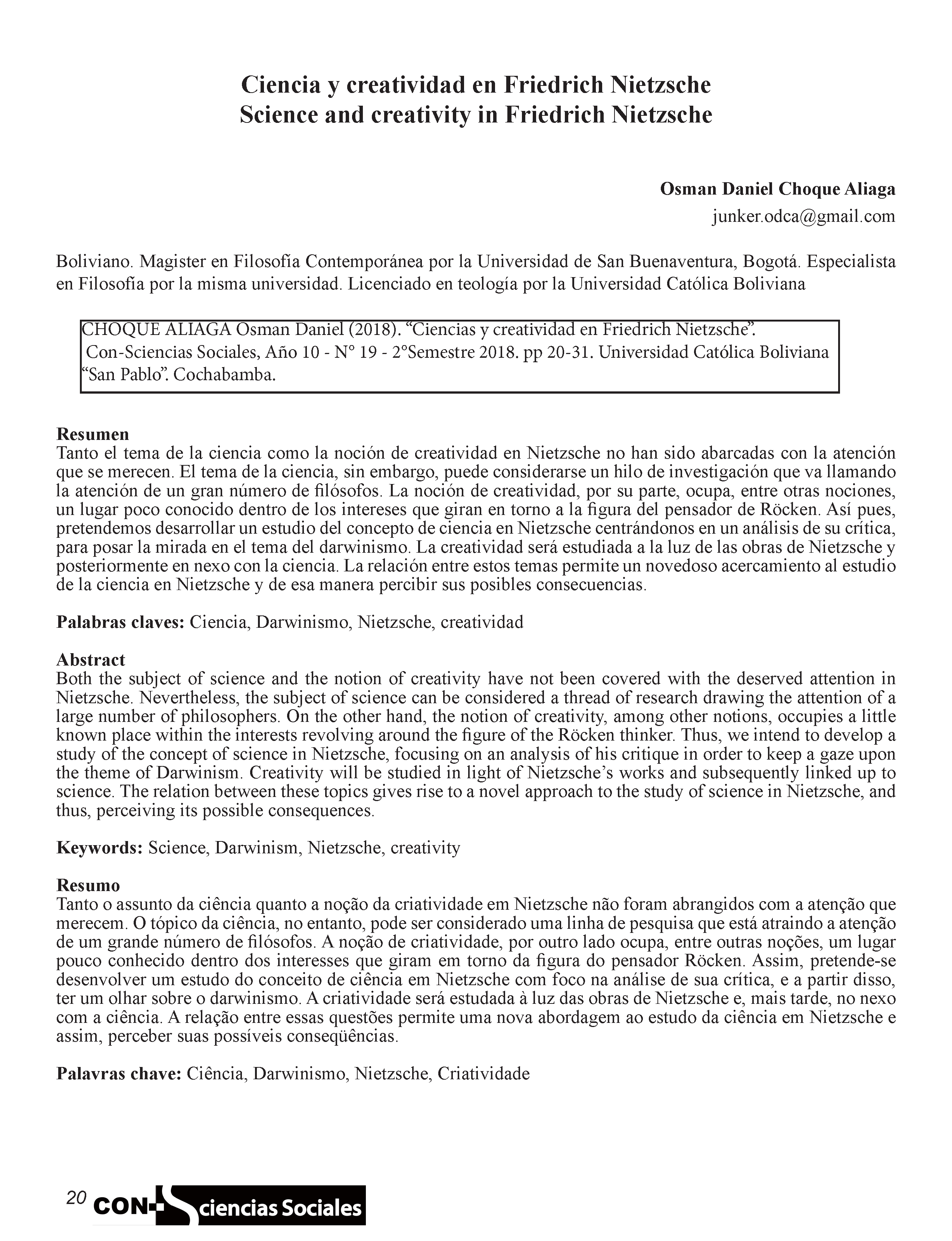Science and creativity in Friedrich Nietzsche
DOI:
https://doi.org/10.35319/consciencias.20181943Keywords:
Science, Darwinism, Nietzsche, creativityAbstract
Both the subject of science and the notion of creativity have not been covered with the deserved attention in Nietzsche. Nevertheless, the subject of science can be considered a thread of research drawing the attention of a large number of philosophers. On the other hand, the notion of creativity, among other notions, occupies a little known place within the interests revolving around the figure of the Röcken thinker. Thus, we intend to develop a study of the concept of science in Nietzsche, focusing on an analysis of his critique in order to keep a gaze upon the theme of Darwinism. Creativity will be studied in light of Nietzsche’s works and subsequently linked up to science. The relation between these topics gives rise to a novel approach to the study of science in Nietzsche, and thus, perceiving its possible consequences.
Downloads
References
ABEL, Günter (1984). Nietzsche: Die Dynamik der Willen zur Macht und die ewige Wiederkehr. Berlin: De Gruyter. DOI: https://doi.org/10.1515/9783110858334
AURENQUE, Diana (2018). Die medizinische Moralkritik Friedrich Nietzsches: Ihre Genese, Bedeutung und Rezeption. Wiesbaden: Springe. DOI: https://doi.org/10.1007/978-3-658-20785-4
BABICH, Babette (2010). “Un problema con cuernos...el problema de la ciencia misma”. La crítica nietzscheana a la razón científica. (L. E. Guervós, Trad.). Estudios Nietzsche, 8, 14-53, Madrid.
BABICH, Babette (2018). “Querying Nietzsches Influence and Meaning Today” in: Ekaterina Polyakova and Yulia Sineokaya, eds., Фридрих Ницше: наследие и проект. М.: Культурная революция, / Friedrich Nietzsche: Heritage and Prospects. Moscow: Cultural Revolution, 391-406, Moscú.
CHOQUE, Osman (2017). “‘El caballero de la exactitud perversa’. El tiempo histórico y la discontinuidad histórica en el pensamiento de Michel Foucault”. Estudios de Filosofía, 55, 119–143, Antioquia. DOI: https://doi.org/10.17533/udea.ef.n55a08
DE SANTIAGO GUERVÓS, Luis Enrique (2012). “Sommer” en Sociedad Española de Estudios sobre Friedrich Nietzsche (En línea) https://www.uma.es/nietzsche-seden/espanol/recensiones/SOMMER-14.pdf (Recuperado el 19 de 04 de 2018).
FORNARI, María (2010). “Nietzsche y el darwinisno”. (M. Parmeggiani Trad.). Estudios Nietzsche, 8, 91-103, Madrid. DOI: https://doi.org/10.24310/EstudiosNIETen.vi8.10282
HEIDEGGER, Martín (1996). Caminos del bosque. Madrid: Alianza
HEIDEGGER, Martín (2013). Nietzsche. Madrid: Ariel.
HEIT, Helmut (2010). “Nietzsche über Wissenschaft, Metaphysik und Perspektivismus” (En línea) https://philpapers.org/rec/HEINBW (Recuperado el 10 de 04 de 2018).
HEIT, Helmut (2014). “Ende der Säkularisierung? Nietzsche und die große Erzählung vom Tod Gottes”. En S. D. Terne, Nietzsches Perspektiven. Über Dichten und Denken in der Moderne. Berlin: De Gruyter.
JANZ, Curt Paul (1981). Friedrich Nietzsche 3. Los diez años del filósofo errante. Madrid: Alianza.
LEYTE, Arturo (2005). Heidegger. Madrid: Alianza.
MÜLLER-LAUTER, Wolfgang (1974). „Nietzsches Lehre vom Willen zur Macht“, in: Nietzsche- Studien 3, 1-60, Berlin. DOI: https://doi.org/10.1515/9783110244236.1
NIEMEYER, Christian (2012). Diccionario Nietzsche. Conceptos, obras, influencias y lugares. (I. De los Ríos, S. Santana, J. L. Puertas, & J. Planells, Trads.) Madrid: Biblioteca Nueva.
NIETZSCHE, Friedrich (1973). El crepúsculo de los ídolos. Madrid: Alianza.
NIETZSCHE, Friedrich (1993). Humano demasiado humano. Madrid: Clásicos de siempre.
NIETZSCHE, Friedrich (1995). El Anticristo. Madrid: Alianza.
NIETZSCHE, Friedrich (1998). Así habló Zaratustra. (A. Sánchez Pascual, Trad.) Madrid: Alianza.
NIETZSCHE, Friedrich (2005). Ecce Homo. Madrid: Alianza.
NIETZSCHE, Friedrich (2007). La Gaya Ciencia. (A. Mardomingo, Trad.) Madrid: Edaf.
NIETZSCHE, Friedrich (2008). Fragmentos Póstumos. (1875-1882) Volumen II. (M. Barrios; J. Aspiunza, Trad.) Madrid: Tecnos.
NIETZSCHE, Friedrich (2012). El nacimiento de la tragedia. (A. Sánchez Pascual, Trad.) Madrid: Alianza.
NIETZSCHE, Friedrich (2017). Aurora (J. Aspiunza, Trad.) Madrid: Tecnos.
SCHWAB, Philipp (2014). “Ethik und Ethikkritik. Philosophie der Existenz bei Kierkegaard und Nietzsche”, in: Existenzphilosophie und Ethik, hrsg. v. Hans Feger u. Manuela Hackel, S. 89-111, Berlin / Boston. DOI: https://doi.org/10.1515/9783110331103.89
SCHWAB, Philipp (2015). “Critique of ‘the System’ and Experimental Philosophy – Nietzsche and Kierkegaard”, in: Nietzsche, German Idealism and Its Critics, hrsg. v. Katia Hay u. Leonel R. dos Santos, S. 223-245, Boston / Berlin. DOI: https://doi.org/10.1515/9783110308181-013
SCHWAB, Philipp (2016). “Interprétation et différence. Derrida lecteur de Nietzsche et de Heidegger”, in: Les Cahiers philosophiques de Strasbourg 39, S. 143-163, París. DOI: https://doi.org/10.4000/cps.326
SOMMER, Andreas Urs (2010). „Nietzsche mit und gegen Darwin in den Schriften von 1888”., in: Nietzscheforschung. Jahrbuch der Nietzsche-Gesellschaft, Bd. 17: Nietzsche, Darwin und die Kritik der Politischen Theologie, S. 31-44, Berlin. DOI: https://doi.org/10.1524/nifo.2010.0000
SOMMER, Andreas Urs (2012a): „Inwiefern ist Ernährung ein philosophisches Problem? Ludwig Feuerbach und Friedrich Nietzsche als Relativierungsdenker“. In: Perspektiven der Philosophie 38 (1): S. 319-342, Berlin. DOI: https://doi.org/10.1163/9789401208796_013
SOMMER, Andreas Urs (2012b). (ed.) Nietzsche-Kommentar. V. 6/1. Der Fall Wagner. Götzen-Dämmerung. Ed. de la Heidelberger Akademie der Wissenschaften. Berlin/Boston: De Gruyter. DOI: https://doi.org/10.1515/9783110286885
SOMMER, Andreas Urs (2014). “Criatividade e ceticismo em Nietzsche”. Cad. Nietzsche, n. 34 - vol. I, 11-31, São Paulo. DOI: https://doi.org/10.1590/S2316-82422014000100002
SOMMER, Andreas Urs (2017a). “Nietzsche como placa giratória “na” modernidade? O Nietzsche de Heidegger nos Cadernos negros e o papel do filósofo” in: Eduardo Nasser e Luís Rubira (Org.): Nietzsche no século XXI. Homenagem ao Grupo de Estudos Nietzsche, S. 263-287, Porto Alegre.
SOMMER, Andreas Urs (2017b). Nietzsche und die Folgen. Stuttgart: J. B. Metzler. DOI: https://doi.org/10.1007/978-3-476-05545-3
VOLPI, Franco (2012). Heidegger y Aristóteles. Buenos Aires: Fondo de Cultura Económica.

Downloads
Published
How to Cite
Issue
Section
License
Copyright (c) 2021 Revista Con-Sciencias Sociales

This work is licensed under a Creative Commons Attribution-NonCommercial 4.0 International License.









